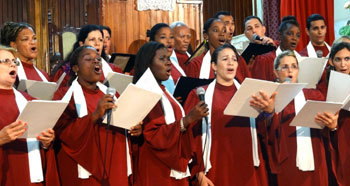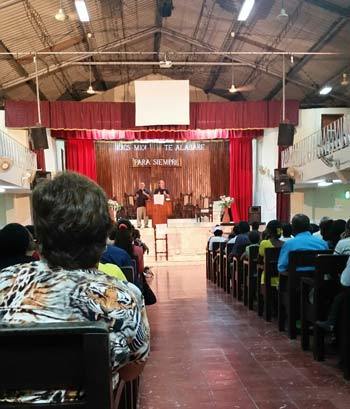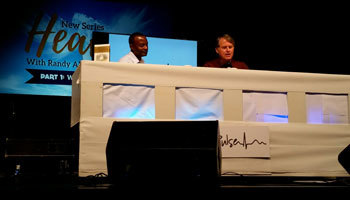Randy Alcorn's Blog, page 143
October 5, 2016
The Beauty of the International Body of Christ: Report from Our Trip to Cuba and Bermuda

 Less than a week ago, Nanci and I returned from a two-week ministry trip to Cuba and Bermuda. I asked for prayer for the trip in my blog, so here’s my report.
Less than a week ago, Nanci and I returned from a two-week ministry trip to Cuba and Bermuda. I asked for prayer for the trip in my blog, so here’s my report.
While in Cuba we were able to travel with a team from ACTION Cuba, a great organization that Eternal Perspective Ministries has supported over the years. It’s amazing what God is doing in this country. (The days without phone and Internet there reminded me of what normal life used to be!) We met many Christ-followers.
 I had the privilege of training Cuban pastors and seminary students, speaking to the staff of Action Cuba, and preaching at a large youth rally on sexual purity where I shared the wisdom of purity and the Good News of Jesus. We heard many encouraging responses, and gave away 700 copies of the Cuban edition of my book The Purity Principle. (They publish four of my books in Cuba. I was amazed how many said they had read and reread them because Christian books are still hard to get there.)
I had the privilege of training Cuban pastors and seminary students, speaking to the staff of Action Cuba, and preaching at a large youth rally on sexual purity where I shared the wisdom of purity and the Good News of Jesus. We heard many encouraging responses, and gave away 700 copies of the Cuban edition of my book The Purity Principle. (They publish four of my books in Cuba. I was amazed how many said they had read and reread them because Christian books are still hard to get there.)
We rode around in old cars and saw on the streets many classic pre-1960 cars, before the embargo, still in working condition due to the hard work and ingenuity of the Cuban people. One day we caught a horse-driven taxi to go into the city. Right when we thought no one else could fit on, they kept adding people. It was a fun adventure, and the people were wonderful.
 As we were leaving Cuba, before going through customs, an airport employee approached me and asked if I was Randy Alcorn. I said yes, assuming he’d been at one of the meetings I’d spoken at. He said, “I’ve read your books and recognized you from your photos.” He took me over to another airport employee who’d also read my books. He said, smiling broadly, “Good to meet you, brother.”
As we were leaving Cuba, before going through customs, an airport employee approached me and asked if I was Randy Alcorn. I said yes, assuming he’d been at one of the meetings I’d spoken at. He said, “I’ve read your books and recognized you from your photos.” He took me over to another airport employee who’d also read my books. He said, smiling broadly, “Good to meet you, brother.”
When I spoke at a training gathering for pastors, during a break I was taken upstairs to meet with the professors of the Bible college. We were in a room that was also their library, consisting perhaps of a few hundred books. I asked how we could help them get more books, and hopefully that will happen.
The international body of Christ is beautiful. I haven't been hugged and kissed by so many “strangers” for many years, most of them precious brothers and sisters in Jesus.
After I spoke in the church, the pastor asked me, on behalf of the churches of Cuba, to greet the body of Christ in the U.S.A. I do that now. The churches in Cuba have spiritual strength that has come through adversity. Their lives aren’t easy, and the standard of living in the country isn’t high. It’s a land rich in resources and potential, but that potential hasn’t been reached. Please pray for the people of Cuba, and especially for the churches.
 In Bermuda, I had the privilege of speaking at Cornerstone Bible Church, a wonderful fellowship of God’s people. My Saturday seminar on what the Bible says about money and possessions was rescheduled for Tuesday night due to Hurricane Karl hitting the island early Saturday morning. Fortunately it was downgraded to Tropical Storm Karl and wasn’t very eventful. On Sunday I joined the church and was interviewed by their pastor, Gary Simons, on Heaven and the New Earth. We turned to different Scriptures and had a great time worshipping Christ. It’s a vibrant church that meets in a school. If you visit Bermuda, I encourage you to attend.
In Bermuda, I had the privilege of speaking at Cornerstone Bible Church, a wonderful fellowship of God’s people. My Saturday seminar on what the Bible says about money and possessions was rescheduled for Tuesday night due to Hurricane Karl hitting the island early Saturday morning. Fortunately it was downgraded to Tropical Storm Karl and wasn’t very eventful. On Sunday I joined the church and was interviewed by their pastor, Gary Simons, on Heaven and the New Earth. We turned to different Scriptures and had a great time worshipping Christ. It’s a vibrant church that meets in a school. If you visit Bermuda, I encourage you to attend.
 Cornerstone has something like 36 different flags hanging in the auditorium each Sunday to signify all the nations represented in their church family. At one point in the message I was asked if we would speak different languages in Heaven. I said we would likely speak our heart language from earth, but then maybe speak a trade language. I used the example of Swahili being a trade language of the nation of Kenya, known by many tribes, and mentioned as an example the specific language of one tribe, the Kikuyu people. Suddenly a couple in the church responded audibly. It turns out they were Kikuyu! Yet another man, as I was signing books after the service, came up and said “I am Kikuyu too!” It meant a lot to them that I had called their tribe out by name. I’d never done that in a message before, so I knew the Holy Spirit was behind it.
Cornerstone has something like 36 different flags hanging in the auditorium each Sunday to signify all the nations represented in their church family. At one point in the message I was asked if we would speak different languages in Heaven. I said we would likely speak our heart language from earth, but then maybe speak a trade language. I used the example of Swahili being a trade language of the nation of Kenya, known by many tribes, and mentioned as an example the specific language of one tribe, the Kikuyu people. Suddenly a couple in the church responded audibly. It turns out they were Kikuyu! Yet another man, as I was signing books after the service, came up and said “I am Kikuyu too!” It meant a lot to them that I had called their tribe out by name. I’d never done that in a message before, so I knew the Holy Spirit was behind it.
Finally, not really changing the subject of God’s great work, but looking at a different aspect of it, I went snorkeling in both Cuba and Bermuda. Here are a few of the hundreds of photos I took of God’s fascinating underwater world.
This Cuban frog fish is maybe the weirdest I’ve seen anywhere in the world! The brother snorkeling with me, who also prints my books in Cuba, has spent a lot of time in Cuban waters and says he’s never seen anything like it. I photographed a frog fish on Maui, but it certainly wasn’t as bizarre as this one! Frog fish are notorious for blending in with the reef. This one blends pretty well with the sand on the ocean floor. Seeing it move in the water was surreal. Consider God’s creativity:

Also weird, but more common and considerably cuter, is this puffer or porcupine fish I photographed while it was hiding under a dock.

In Bermuda, this angel fish was one of my favorites. The reef there is breathtakingly beautiful. Below it is a colorful parrotfish, about three feet long, and its companion munching on the coral.


Many thanks for your prayers and partnership in the Gospel!
Randy
After this I looked, and behold, a great multitude that no one could number, from every nation, from all tribes and peoples and languages, standing before the throne and before the Lamb, clothed in white robes, with palm branches in their hands, and crying out with a loud voice, “Salvation belongs to our God who sits on the throne, and to the Lamb!” And all the angels were standing around the throne and around the elders and the four living creatures, and they fell on their faces before the throne and worshiped God,saying, “Amen! Blessing and glory and wisdom and thanksgiving and honor and power and might be to our God forever and ever! Amen.” (Revelation 7:9-12)
October 3, 2016
Good and Angry: a New Book for Those Dealing with Irritation, Complaining, and Bitterness

Every emotion is powerful and potentially stressful. But nothing so poisons the mind and sours the soul as uncontrolled anger and resentment. Failure to effectively deal with these emotions in a godly way, and failure to forgive others will increase stress and promote bitterness.
Scripture says it all:
Get rid of all bitterness, rage and anger, brawling and slander, along with every form of malice. Be kind and compassionate to one another, forgiving each other, just as in Christ God forgave you. (Ephesians 4:31–32)
EPM has long recommended the excellent ministry of CCEF, the Christian Counseling & Educational Foundation. I deeply appreciate their faculty members, including David Powlison, and over the years have recommended his books, including Speaking Truth in Love and Breaking the Addictive Cycle.
David has a new book that I think will benefit many. Good and Angry: Redeeming Anger, Irritation, Complaining, and Bitterness is a remarkably penetrating treatment of a vital but neglected subject. I kept underlining profound statements, including “Anger is not an it…anger does not happen to you…the whole person does anger.” Powlison’s insights on patience, forgiveness, mercy, and grace are invaluable. He unapologetically addresses God’s anger against sin, while helping us look at our own anger, which is often less righteous than we suppose. Still, he validates good anger.
Here’s just one insight from the book:
When anger goes astray, it says something about how we are going astray inside, about who is the center of the universe. When anger runs amok into temper, grousing, or bitterness, you don’t just need a technique to calm yourself down. You don’t just need your circumstances to change. You don’t just need other people to change. Your core motives must change. The god you worship (my will be done, my kingdom come…or else) must be overthrown.
This book reflects a big view of God, never pitting one divine attribute against another. Powlison’s discussion of the weaknesses of the misguided perception about anger toward God being healthy is a breath of fresh air. I personally benefited from this outstanding book, and highly recommend it.
David shares more about why he wrote Good and Angry, and his hopes for readers:
If you or someone in your family struggles with anger…or irritation, complaining, or bitterness, I encourage you to read Good and Angry. I think you’ll find it a great help.
September 30, 2016
Transgenderism, Outdoor School Policies, and How Christian Families Might Respond

Though it was foreseen for many years, nationwide legalized homosexual marriage was a long time in coming. I think we’re beginning to see that now that it’s here, it has broken down many restraining walls in our society. Consider the speed at which transgenderism and gender identity have grabbed hold of our culture, and even the world of our children and grandchildren.
Christian families in my hometown of Gresham, Oregon are feeling some of those effects after reading Oregon’s new public school policies regarding transgender students. One of the documents pertains to 6th grade outdoor school, which is run by a local school district. The other document serves to provide guidance to educators and schools, including in the areas of Physical Education and Health/Sex Education.
Here are some quotes from the new outdoor school policy (the student leaders mentioned are highschoolers, typically aged 14-18):
2.7 Will my child have a transgender or gender nonconforming Student Leader?
Maybe. Student Leaders are asked to identify as male or female. If a student leader who is transgender identifies as male, he will lead male student cabin groups and be placed in male cabins. If a student leader who is transgender identifies as female, she will lead female student cabin groups and be placed in female cabins.
2.9 If my child is gender nonconforming or transgender, where will they change clothes and where will they shower?
At Outdoor School we support a student’s right to use a facility corresponding with their gender identity as consistently expressed at school or to have access to a private or single use facility.
2.10 Is it possible that my child will be placed in a cabin with a gender nonconforming or transgender student?
Yes. At Outdoor School we respect the gender identity asserted by the student. Sixth grade students that identify as male will be placed in male cabins. Student leaders that identify as male will lead male student cabin groups and be placed in male cabins. Sixth grade students that identify as female will be placed in female cabins. A student who was assigned a male gender at birth, and identifies as female, will be placed in a girl’s cabin. A student who was assigned a female gender at birth, and identifies as male, will be placed in a male cabin.
2.13 Will the topic of gender diverse youth be discussed at Outdoor School?
Maybe. The topic of transgender and gender nonconformity is not a class or area of instruction at Outdoor School, however, the topic is prevalent in the community and the news.
A parent who attended a recent outdoor school meeting for teachers wrote, “Bottom line, ODS can't and won't assure teachers and parents that a sixth grade student will not be in a cabin with a high school student [cabin leader] of the opposite gender.” (Another major concern for many families is that because students attending outdoor school are unable to phone home, if an issue does arise, they won’t be able to contact their parents and express their concerns or discomforts.)
Several families I know have prayerfully and thoughtfully decided to not have their children attend outdoor school this fall. Here’s an example of how parents might graciously and respectfully communicate that choice. It was written by my daughter Angela, who gave me permission to share it. I believe it speaks truth and reflects grace:
We’re sorry to say that we've decided our son won’t be attending outdoor school this year. We read the new school district policy on transgender counselors and campers and we are aware of several situations that happened last year, and we’re uncomfortable with potentially putting our son in that situation. Just so you know, we’ve had some great conversations with him about being respectful and kind to people who have different beliefs and make different choices than we do, but at this point we’re just not comfortable sending him away for several nights with all of the unknowns created by this policy.
We’re not sure how this will affect his grade, and want to be sure there’s something else he can do to make up for it. Do you know if anything else will be offered on those days? Thanks for understanding, and please let us know if you have any questions, as we’d love to keep an open dialogue with you about this.
If this hasn’t been addressed in your state, and affected your school district, I’m confident it will be in the coming months and years.
Earlier this year, a local news station in my area reported that in a book which claims to be for children “age 10 and up” has been on the state-approved list for use in public schools. As its title It’s Perfectly Normal suggests, it seeks to normalize gender fluidity and other sexual acts and masturbation—along with graphic illustrations of naked teens and adults involved in those activities.[1]
Here are some other examples. According to Oregon law:
Students at any age can access reproductive care—without parental knowledge or consent (ORS 109.610, 640). A minor age 15 or older can have an abortion without parental consent.
14-year-old students can receive mental health service which could include counsel related to gender transformation—without parental knowledge or consent (ORS 109.675).
15-year-old students can consent to services such as gender transformation treatments, including puberty blockers, counseling, drugs, advocacy and sex change surgery—without parental notification or consent (ORS 109.640).
I have a friend who’s in an authority position, and has received orders that part of his job is to now enforce the right of men to enter women’s restrooms, provided they personally identify as females. (But practically, can he actually confront them on this, and what will be the results of doing so?) He has strong reservations about this policy and sees real dangers, but told me that if he speaks up about it, he’ll almost certainly lose his job.
These are tough issues and they’re not going away. Now more than ever, Christians have to consider how we can communicate with those with whom we disagree, in a spirit of grace and truth.
Writing for the ERLC (Ethics & Religious Liberty Commission), Andrew Walker recommends that parents think through their responses to new policies now rather than later, and establish a tipping point for their families:
What actions taken by your local school will be sufficient for you to re-evaluate public education? Is having a teacher reprimand your child for his or her belief about marriage, sex, and gender acceptable? Will you allow them to be in schools where bathroom policies are based on gender identity rather than biological sex? Are you uncomfortable with a biological male having access to the restroom and locker room that your daughter uses? Not establishing a tipping point could leave your child over-exposed to environments they shouldn’t be in. Not thinking about a tipping point is irresponsible and will communicate carelessness about a child’s education and Christian formation. It is advisable that spouses have a candid conversation and establish a line in the sand.
I read and appreciated Kevin DeYoung’s post “What Does the Bible Say About Transgenderism?” He doesn’t address all the aspects (who possibly can?), but some of what he says is very helpful. There will ultimately be many more comments added, many of them in strong disagreement, I’m sure. You can learn a lot from the comments about the degree of confusion and hostility associated with this.
Earlier Kevin did a post titled “A Transgendered Thought Experiment.” Though this offended a lot of people, both believers and unbelievers (just scan the many comments), I think it’s relevant to any who think that God really still does create people male or female, and that confused or misdirected sexual desires are part of the Fall just as much as physical disabilities.
You might also check out a helpful Q&A that Rosaria Butterfield, a former gay activist, did recently with Revive Our Hearts on these timely issues. For parents needing some pointers for having conversations with their kids, I also recommend Mark Spansel’s article “How to Talk to Your Kids About Gender.”
[1] Sex ed books pulled from library shelves at Rainier elementary school
Photo: Pixabay
September 28, 2016
It’s Possible to Enjoy Watching Others Win

It’s not always easy to witness the success of others without pangs of envy creeping in. I heard one story of a fortunate woman who won an extreme home makeover but whose neighbors were outraged at the invasion of their space by construction workers and film crews.They spoke critically of their neighbor, saying she probably didn’t know how to take care of a decent home.They called the police because of the disturbance, even though they knew it would be short lived. Jealousy surfaced. Those who didn’t directly benefit from her good fortune didn’t rejoice with her—they resented her.
Suppose you and a friend entered a store and your friend was awarded $100,000 for being the store’s 100,000th customer. Would you be hounded by the wish that it had been you instead? Would you expect your friend to split it with you since you held the door open and otherwise would have won? Or would you have simply rejoiced for her?
I’ve heard people admit that looking at others’ Facebook pages depresses them because they see new houses or fun vacations they’ll never have. Envy undermines the opportunity for shared joy.
The degree to which we can be happy for other people without envying or resenting them determines how happy we’ll truly be. Why? Because if we can only rejoice when positive things happen to us, the number of things that can make us happy is greatly reduced.
I enjoy winning. But by God’s grace, I’ve become a gracious loser, which makes me a happier person. When coaching high school tennis, I was playing against our team’s number one singles player. We’d played a couple of times a week for three years, and he’d never beaten me. But he kept getting better . . . and I didn’t. That day, though I tried my best, he beat me for the first time (and not the last).
Spontaneously, when he won the final point, we both ran to the net and hugged each other, smiling, laughing, and celebrating. I realized, to my surprise, that I was as genuinely happy as he was.
Why was I so happy? I had invested myself in him and developing his skills. His success was my success.
“Rejoice with those who rejoice” (Romans 12:15, NIV) had new meaning for me. I realized that when we pour our lives into others, we truly want them to succeed.
Our happiness will always be small as long as we can only be happy for ourselves. But when we can be genuinely happy for our spouse, children, grandchildren, neighbors, and friends—and those who live thousands of miles away but are benefiting from the prayers we offer and the money we give to help build wells or translate the Bible into their language— there will be no end to our happiness.
Excerpted from Randy’s book Happiness. See also his small book God’s Promise of Happiness.
Photo: Pixabay
September 26, 2016
Sexual Abuse Is Horrible and Should Be Punished…But Some Accusations of Sexual Abuse Are False

Before I address concern about false accusations, I want to say emphatically: If you or someone you know has been sexually abused PLEASE seek help from friends, family, local authorities, and a trusted pastor. Many victims of sexual abuse don’t speak up due to shame and/or fear of being disbelieved.
What I am saying next is to third parties who jump to conclusions when they hear accusations, not to victims who know first-hand the guilt of the perpetrator.
If I were a judge, there is no sin, no crime on the planet that would prompt me to act with more severe justice than the sexual abuse of children. I would also bring harsh judgment on those who covered up or conspired to cover-up the crime.
BUT if I were that judge, I would need to hear all the evidence from both sides before coming to my conclusion. As difficult courtroom trials often demonstrate, all the opinions in the world of those who have not seen the evidence, or have seen only a part of it, in the end do not prove guilt or innocence. Sometimes the courts are wrong, of course, but far more often people are wrong who form their opinions based on hearsay.
Since I’m not a judge and not capable of carrying out anything close to a full-scale investigation when accusations of sexual abuse come up, I must listen to both sides, or those that have heard from both sides, and then determine, “Well, maybe or probably or probably not, but…there is just no way I can know.” Whether the accused was guilty, I am not qualified to say. So I will sign petitions against abuse and speak against racism in every form, but I cannot normally speak against a particular person who is accused.
Even the most serious accusation should never lead us to assume guilt where it has not been proven! There have been murder cases where public outrage has resulted in convictions based on superficial evidence. Later, through DNA and other objective means, innocence has been proven and people have been released from jail, like this man who was released 25 years after being falsely accused of murdering his wife.
Murder and abuse are categorically evil. But one can take murder and abuse seriously without assuming that because someone has been accused, and because many people SAY a person must be guilty, that therefore he or she really is guilty.
I’m often asked via emails to speak out against a particular person or group who has been accused of abuse or covering up abuse. People will link me to a website they consider to be proof. But what is on the website are words, not proof. Another website takes the opposite position, offering proof to the contrary. When I say I can’t make a public condemnation, typically I am told I really don’t care about the victims. But I do…I just don’t want to be guilty of making others the victims of my uniformed accusations!
Apart from being on a jury, how can I have enough information to draw an absolute conclusion? Can I base my conclusion on media reports alone? Many years ago I was often in the newspapers related to civil disobedience at abortion clinics on behalf of unborn children. I would read the article and sometimes not just some but most of it was simply false—yet I discovered that people in my own church believed whatever they read. This is one of the reasons I am slow to judgment.
Sometimes it seems 99% likely the person is guilty. But if that’s true, then one out of 100 times the person is innocent. How would you like to be that person or a family member of that person who is innocent, but is condemned by society’s outrage?
Just as there have been many cases when guilt has been proven real even though denied, there are also many documented cases where the accusations have been false, and lives have been ruined. Let me be absolutely clear: all sexual abuse is horrific and detestable, and we should absolutely stand in defense of its victims. But that’s not the same as saying each and every accusation of sexual abuse should be assumed to be true!
We live in a fallen world where there is true sexual abuse, and where there are false accusations. All accusations of sexual abuse should be taken seriously and carefully investigated by qualified authorities. But I am suggesting that we should refrain from listening to only one side of the story and draw no final conclusions unless and until the charges have been proven.
I personally know a man whose reputation was ruined when a woman who I knew to be unstable (from long-term personal experience) falsely accused him of sexually abusing her daughter. Investigation exonerated him, but he and his wife suffered immensely, and many believed that just because he was accused of it, it HAD to be true.
I’ve also confronted those accused of child abuse, one of whom ended up in prison (I’m not sure, but it’s possible that my role in the process contributed to his conviction). I believed the evidence to be substantial and directly confronted him and others with it. Though he denied his guilt, later he admitted he’d done it.
I have no second thoughts about what I did, but I believe that justice cuts both ways. We should stand up for those who have been sexually abused, and for the same reasons we should stand up for those who have been falsely accused of sexual abuse.
In some cases innocence can possibly be proven, but unless an alibi is rock solid, it usually can’t. This is one of the reasons I encourage believers to practice wisdom—not only to avoid temptation and sin but also not to put themselves in a position where a false accusation could easily be made. For instance, I recommend youth pastors never meet privately with young girls. When I was a youth pastor I did have such meetings (nearly all of us did back in those days), but if it were today, I would not take the chance. There are qualified females who work with girls. (Of course, same gender crimes and accusations are common too.)
God’s Word says, “Therefore do not pronounce judgment before the time, before the Lord comes, who will bring to light the things now hidden in darkness and will disclose the purposes of the heart. Then each one will receive his commendation from God” (1 Corinthians 4:5, ESV). Yes, where guilt is real there is condemnation, but where people have condemned unfairly, there will also be commendation.
In some cases we will never know for sure whether there’s guilt or innocence. I pray for them like this: “Father, you are the all-knowing Judge, I am not: If they are innocent, comfort them and help make their innocence known; if they are guilty, bring them to confession, repentance and forgiveness…bring upon them your just judgment in this world, and if not in the world to come.”
Where there is true guilt, God offers forgiveness, but not legal exoneration. Criminals are sinners like the rest of us, and God can forgive and transform them, even if they must spend the rest of their lives in prison. At EPM we correspond with hundreds of prisoners, and God is doing powerful things in many lives.
The next person abused could be you or someone you love. And the next person falsely accused could be you or someone you love. So let’s be quick to speak up for children and innocent people, and to encourage careful investigation of accusations. But let’s also be quick to realize some accusations are indeed false. Jesus said, “Do unto others as you would have them do onto you” (Luke 6:31). As the Contemporary English Version puts it, “Treat others just as you want to be treated.”
Photo: Pixabay
September 23, 2016
Will the New Earth Have a Sun and Moon?

People who think the New Earth won’t have a sun and moon generally refer to three passages:
The city does not need the sun or the moon to shine on it, for the glory of God gives it light, and the Lamb is its lamp. (Revelation 21:23)
There will be no more night. They will not need the light of a lamp or the light of the sun, for the Lord God will give them light. (Revelation 22:5)
The sun will no more be your light by day, nor will the brightness of the moon shine on you, for the Lord will be your everlasting light, and your God will be your glory. Your sun will never set again, and your moon will wane no more; the Lord will be your everlasting light, and your days of sorrow will end. Then will all your people be righteous and they will possess the land forever. (Isaiah 60:19-21)
Notice that none of these verses actually says there will be no more sun or moon. (Reread them carefully.) They say that the New Jerusalem will not need their light, for sun and moon will be outshone by God’s glory. The third passage says that at the time when God’s people will possess the land forever, the sun won’t set and the moon won’t wane, yet neither will dominate the sky because of God’s brighter light.
The emphasis isn’t on the elimination of sun and moon, but on their being overshadowed by the greater light of God. Who needs a reading lamp when standing under the noonday sun? Who needs the sun when the light of God’s presence pervades the city? The sun is local and limited, easily obscured by clouds. God’s light is universal, all pervading; nothing can obstruct it.
God Himself will be the light source for the New Jerusalem, restoring the original pattern that existed in Genesis 1 before the creation of sun and moon. Light preceded the light-holders, sun and moon, and apparently God’s very being provided that light (Genesis 1:3). So it will be again—another example of how the last chapters of the Bible reestablish something from the first chapters.
Isaiah tells us, “The Lord will be your everlasting light” (60:19). But John goes further, saying, “The Lamb is its lamp” (Revelation 21:23). John tells us in his Gospel that Jesus is “the true light that gives light to every man” and the light that “shines in the darkness, but the darkness has not understood it” (John 1:9, 5). He records Christ’s words, “I am the light of the world. Whoever follows me will never walk in darkness, but will have the light of life” (John8:12). And John sees what Isaiah couldn’t: The God who is the city’s light is the Messiah Himself.
Isaiah says to God, “Nations will come to your light, and kings to the brightness of your dawn” (Isaiah 60:3). The New Jerusalem will be a city illuminated not only by God’s holiness but also by His grace.
Photo: Unsplash
September 21, 2016
Seven Truths That Guided Denny Gradin Through Cancer and into Eternity
 Denny Gradin was a missionary with a big heart for Spanish-speaking peoples. In August 2012, he was initially diagnosed with cancer, and two months later wrote his “Basic Truths That Guide My Life” in response to the questions he received about how he was dealing with his diagnosis. It continued to express his heart until the Lord called him home, 17 months later.
Denny Gradin was a missionary with a big heart for Spanish-speaking peoples. In August 2012, he was initially diagnosed with cancer, and two months later wrote his “Basic Truths That Guide My Life” in response to the questions he received about how he was dealing with his diagnosis. It continued to express his heart until the Lord called him home, 17 months later.
Denny’s points also remind me of John Piper’s article “Don’t Waste Your Cancer,” another excellent perspective for those facing tough diagnoses.
J.C. Ryle wrote, “Health is a good thing but sickness is far better if it leads us to God.” May we accept health as God’s blessing and its absence as God’s severe mercy, and seek to glorify Him through both.
Listen to Denny Gradin and apply his thinking to your own life as you seek to “finish well” for the glory of God! —Randy Alcorn
In the following, I have tried to delineate the underlying principles that describe how I live. I realize that not everyone shares these same values or perspectives. Nevertheless, I write this in an effort to help others understand where I am coming from, as I deal with the recent diagnosis of a very aggressive cancer that has spread to my lymph nodes from an unknown source, as well as a recent serious infection.
1. God exists, and is sovereign over all things in the universe. Whereas God is in control of everything, and there is nothing that happens outside of what He allows, nevertheless He has created us as humans with the ability to make choices for good or evil. On the surface, there appears to be a logical contradiction between the two, but God is an infinite being. By definition, God is not limited by time or space or power or knowledge or any other factor. (For instance, with God one day is as a thousand years, and a thousand years as one day.) Since we are finite beings that have these limitations, we cannot fully comprehend God or what He does, but can only recognize Him for who he is.
2. Through our first parents, mankind has chosen to disobey God; as a result, by nature we do not have a relationship with God. No matter how hard we try, we cannot live up to God's perfect standard. Nevertheless, Jesus Christ died on the cross in payment of the penalty for our sin. Through Jesus Christ each of us has the possibility of having a personal relationship with God.
3. God loves us, and wants the best for each of us. This does not mean that life will be a bed of roses or without any problems. Even though there will be difficult times, each of these is under His control, and He is present with us through it all. Some of these may be discipline for correction when we may not be obeying Him, and others may merely be part of things that He allows to prepare us for greater usefulness for Him and to others. Sometimes we may never understand it. Nevertheless, we can rest assured that He always has our best interest at heart. I have been through many very difficult times in my life that I could not understand then, only to come to a realization later on that God had His purposes in allowing it. These experiences have caused my faith in Him to grow, so that as I face new and more difficult challenges, I have an anchor that sustains me.
4. My main desire in life is to allow Christ to live His life through me. That does not mean that l am perfect, but I seek to please God in all that I do. I want to maintain a clear and open relationship between us, so that nothing on my part would hinder God in accomplishing all that He wants to do through me.
5. Since God is in control and desires the best for me, I tend to look for his fingerprints in the broader things that happen in life. This does not mean going to the extreme of trying to interpret every single thing that happens. Nevertheless, sometimes the content, extent, or timing of contacts with people, conversations, or experiences seem to have particular significance at specific moments. These things help me to notice His hand and give me comfort or guidance for present realities or decisions regarding the future.
6. Worrying about things does not really change the outcome for the better. Anxiety is the feeling that results from allowing our mind to dwell excessively on the negative, unknown, or uncertain factors in our lives. The opposite of worry and anxiety is peace. When someone's peace is based on things not under their control (the people and circumstances of their lives, having money, good health, etc.), and when these things are negative or are lost, then worry and anxiety take over.
On the other hand, the peace that comes from a relationship with God is based on His presence and control in our lives. His control and presence with us do not change, in spite of all of the other changes that may come our way. It is not sticking one's head in the sand like an ostrich, and hoping that the negative aspects are not true or will go away; it is fully recognizing the hardships but knowing that God will be with us in the midst of them, regardless of the outcome. As my thoughts and emotions are anchored in Him and His care for me, it keeps me from worry and anxiety.
7. If God desires, He is fully capable of healing me of the cancer or sending it into remission, to extend my time on this earth. He can do this with or without medical means, or He can choose not to do it at all. The fact that God does not always heal when we pray for it is not necessarily an indication of unbelief or sin in the life of the person. God remains sovereign to do what He knows is best.
For further information, the following Bible verses support these points:
Isaiah 40:18-31; Romans 8:31-39; Ephesians 1:11; 2 Peter 3:8
John 3:16-21; Romans 3:23; Romans 6:23; Ephesians 2:1-10
John 16:32-33; Romans 5:6-11; Romans 8:28; Hebrews 12:5-9
Matthew 6:33; Galatians 2:20; 1 John 1:5-10
Esther 6:1-14; Proverbs 3:5-6; Lamentations 3:22-23
Matthew 6:25-34; John 14:27; Philippians 4:6-7; 1 Peter 5:6-7
2 Kings 20:1-7; 2 Corinthians 12:7-9; Philippians 1:21-25
September 19, 2016
When It Is and Isn’t Plagiarism

The problem of plagiarism by pastors and Christian writers is a real one, though I think it’s less widespread than some believe.
From time to time, I’m reminded of how common it is for people to believe a writer or speaker stole his or her material. Sometimes material is indeed used word for word without crediting the source, and this is unethical. But other times, people assume an idea or material has been stolen when it isn't the case.
Mark Twain wrote, “There is no such thing as a new idea. It is impossible. We simply take a lot of old ideas and put them into a sort of mental kaleidoscope. We give them a turn and they make new and curious combinations. We keep on turning and making new combinations indefinitely; but they are the same old pieces of colored glass that have been in use through all the ages.”
Had I written the preceding words myself, without putting them in quotation marks and crediting Twain, I’d have been guilty of plagiarism. Had I stated the essence of it in my own words by saying “No thoughts we have can be entirely original,” that would be okay, particularly because many others have made similar observations. However, if I went on to develop Twain’s words in any similar way to his, I would need to credit him, saying something like, “To paraphrase Mark Twain…”
Were I to merely change little words here and there, altering “it is impossible” to “It can’t be done,” but still speaking of a “mental kaleidoscope” or “curious combinations” or “same old pieces of colored glass,” and if I failed to credit Twain for these distinctive phrases, I would still be plagiarizing even if the majority of the words were different than his. I would be guilty of what’s called “mosaic plagiarism.”
I just rewrote Twain’s words while retaining all three of those distinctive phrases and submitted it to an online plagiarism checker. It didn’t catch them. A student, writer, or speaker might or might not get away with this kind of plagiarism, but it would be dishonest nonetheless. If you are building a distinctive flow of thought based on someone else’s words, it’s like taking someone else’s painting, changing some things, adding some colors, and then signing it as if you were the original painter. You weren’t.
Plagiarism is a major problem with college students. Over 50% of college papers contained material plagiarized by the internet. Sadly, as I’ve written about before, plagiarism is even a problem among some pastors, in terms of their sermons and written materials for the church. (In this article, Don Carson, Tim Keller, and a few others address the problem of plagiarism among Christian leaders.)
Years ago someone contacted our ministry because it appeared I had plagiarized a nationally-known preacher’s words. They had read The Treasure Principle and informed us that part of it was identical to what they had heard from this popular preacher. It turns out fifteen minutes of his message were taken word for word from my book, four whole pages of it without attribution. His ministry had then published that message in a book that accompanied his messages. Since she read my book after hearing his message and reading his booklet, it’s understandable why she wondered if I had stolen his material. Fortunately my book had come out years before his message and booklet, so it was easy to prove the original material was mine, not his. (He later apologized to me, which I appreciated.)
However, the talk about the serious sin of plagiarism has helped cultivate a suspicion that’s sometimes unhealthy.
For instance, there's a very popular book, written by a pastor that says much that’s a paraphrase of, and occasionally nearly word for word, from portions of my book Money, Possessions and Eternity. I may or may not have been the only one to notice, but one day I won’t be surprised if someone reads my book and thinks I stole the material from him. But the truth is, I love this man and believe he was significantly influenced by my book and didn’t realize the extent to which he had drawn his thinking and words from it. That doesn’t offend me, as I’m glad he’s reaching many people who will never read my book. The brother wasn’t plagiarizing; rather, he’d taken some of my words to heart and in turn they became his.
Sometimes in my own writing I say something not identical to C. S. Lewis or A. W. Tozer, but close enough that I’ve needed to give them credit even though my words were different. And I’ll bet I’ve written things that without me knowing it are close enough to Lewis, Tozer, Francis Schaeffer, John Piper, Charles Spurgeon, and others that if I’d realized it, I would have given them credit. Unawareness isn’t the same as plagiarism.
 We should be cautious in our assumptions. People have told me how parts of my book Heaven are very much like N.T. Wright’s Surprised by Hope, his book on Heaven and the New Earth. I use many of the same quotations he did. But his book came out several years after mine. This isn’t plagiarism at all. Dr. Wright just saw and liked some of my research (he emailed me saying he’d read and appreciated it) and then he quoted the same sources I did. Many of these he probably found in his original research, just as I did. Maybe he got some from my book, and if so, I’m delighted. I certainly got a number of great quotations from the 140 books on Heaven I read!
We should be cautious in our assumptions. People have told me how parts of my book Heaven are very much like N.T. Wright’s Surprised by Hope, his book on Heaven and the New Earth. I use many of the same quotations he did. But his book came out several years after mine. This isn’t plagiarism at all. Dr. Wright just saw and liked some of my research (he emailed me saying he’d read and appreciated it) and then he quoted the same sources I did. Many of these he probably found in his original research, just as I did. Maybe he got some from my book, and if so, I’m delighted. I certainly got a number of great quotations from the 140 books on Heaven I read!
When I see a great Spurgeon quotation in someone's book and then quote it, I don't say “Here’s a quote from Spurgeon which I got from Phil Yancey who got it from Chuck Colson.” I just go find it in Spurgeon’s original message or writings, and cite the original source. It’s not plagiarism to quote someone whose words you first saw on Facebook or Twitter, but you better attribute it to the original person and double-check the words (they’re often wrong on social media).
I used an illustration once that someone told me was from a book of Max Lucado’s, but it was one of his books I hadn’t read. The story was one I’ve heard a number of times, and first heard as a teenager from Pastor Marden Wickman, my first pastor. Max never said he was inventing the illustration, nor did I. But the person wondered why I wasn’t attributing it to Max. Any time I’ve gotten something from Max that I didn’t hear somewhere else first, I’ve quoted Max. That’s why my books are so loaded with quotations—I want to make sure I give credit where it’s due.
Someone wrote me twenty years ago to tell me my novel Deadline was obviously based on a book he’d read, so why didn’t I acknowledge that? He told me the author’s name and the book title, both of which I’d never heard of. I tried to find it and couldn’t. I only wish I’d written it down so I could hunt it down now (easy with the internet), read it and find out how much Deadline was actually like it.
I’ve been told by several people that an illustration a particular speaker uses is an obvious adaptation of my dot and line illustration. But if so, so what? He’s read some of my books but likely doesn’t even remember me talking about the dot and line. And honestly, did I come up with the dot and the line, or did one source, or perhaps many, help implant that concept in my mind years ago? I have no doubt several similar illustrations have been used. One time I read a message by Charles Spurgeon in which he uses a distinctive illustration that Jonathan Edwards used. Spurgeon, a voracious reader who read Edwards, likely got it from him. He wasn’t plagiarizing; he just didn’t remember where it came from.
There’s been a movie and several songs called “An Audience of One” written since I first used that term in several of my books in the early 1990s. I have no idea whether anyone read those books, but I do know the expression wasn’t original with me. I remember reading an obscure book, I have no idea who wrote it, and there was a passing phrase used by the author, and it was either “the audience of one,” or something similar. I loved the phrase and started using it in my books. Some have gotten it from me, others have gotten it from whoever I got it from, and he probably got it from his pastor, Sunday school teacher, or another! So to whom does it belong? Certainly not me!
It would ruin a book to start by saying, “Here’s an expression I got from a book by Randy Alcorn, who got it from somebody he doesn’t remember.” I’m not going to start saying, “Here’s a thought that’s a hybrid of Spurgeon and Lewis, and John Owen and G.K. Chesterton said something similar (and who knows who they got it from, maybe from Paul, who got it from the Holy Spirit).”
In fact, when an insight comes from God, why should it surprise us to think that thousands of others have come up with the same idea?
I’m part of an online writer’s group where this comes up often. A movie or made-for-TV drama comes out and one of the writers feels as if it was taken straight from their novel. I know several writer friends who say entire television series match their novels in startling detail. In many cases the ideas and terminology are uncannily similar.
Sometimes there is theft, no doubt about it, but often people living in the same culture at the same time and being exposed to the same media, books, and movies, simply come up with the same ideas, illustrations and sometimes even, on a small scale, the same wording (though not four pages of it). :) This is often labeled, in creative circles, “It’s in the ether.” These are thoughts and ideas that seem to be “out there somewhere” and tapped into by multiple people. Here’s what Jim Banister says:
Many ideas simply bud simultaneously and spontaneously in multiple minds separated by vast distances. Some even argue that once a thought is manifested, it’s in the “ether” and available to anyone else in the world tuned to pick it up. Most of us have had the experience of thinking up something we believe is totally original and saying to ourselves, “Wow, that’s a great idea. I should do it.” Then you proceed to let that idea slip to the back of a closet in your mind only to see the “invention” appear in the marketplace one, five, ten years later, produced by some enterprising individual who tapped into your ether channel (or so we’d like to believe).[i]
I remember when writing Heaven “coming up” with the illustration of feeling like you're leaving the party early when you're dying, when in fact you're actually arriving at the greater party in Heaven early and everyone you love is going to follow you there. But had someone come up with this idea before I did? I’d wager they did. In all probability that illustration could be found in books written long ago. But as far as I know, I never read them. So if it’s a good illustration, why wouldn’t have someone come up with it before I did? Even when something is “sort of” original with us—that is, we didn't get it directly from someone else—it certainly doesn’t mean we were the first person to think of it!
It reminds me too that if I allow someone to heavily or directly influence me, I should be sure to say that. But the truth is, I’m sure I’ve written many things that were indirectly influenced by countless writers I’ve forgotten. When you read thousands of books, as I have, each book is like another bucket of water thrown into your mental reservoir. You draw from that reservoir every time you speak and write.
Most of us are influenced by dozens if not hundreds of people, and much of what we say isn’t original. It’s impossible to even remember when or where we heard some things. No doubt I say countless things that were influenced not just by famous authors but by obscure sources, and not only from books I’ve read and messages I’ve heard, but from personal conversations.
My policy is to credit a large number of people in the acknowledgments, knowing some of my thoughts and perhaps even specific words come from them, even though I don’t recall who said what. For sure, whenever I know I’m using someone’s words, even if they are unpublished, I always give them the credit. In the case of illustrations, I may have heard them from others or come up with them “independently” (always a relative term since I’ve been influenced by thousands of others).
I once heard a pastor preach who was almost paranoid about citing every source, to the point it was distracting. By all means, quotations should be credited. But when you use the ancient illustration of freshwater Sea of Galilee having an outlet in the form of the Jordan River, which flows to the Dead Sea where there is no outlet, and therefore no life, there is no need to try to find the source! Nearly everyone has heard that and knows you didn’t make it up.
Here are my suggestions if you think any writer or pastor is taking credit for things that originated with you or someone else you’ve read or heard:
Don’t assume the worst. It’s very possible they thought of these things independently, even if others thought of them before they did.
If the specific wording is drawn from someone else, and it’s more than, say, ten identical words, point that out and send them a link to whatever someone else wrote. Keep in mind that it may well be the OTHER person who took those words from the person you’re writing to! OR the person themselves thought the words were original with an editor or researcher assisting them in the project—therefore, they may be guilty of failing to double-check or of taking credit for what they thought were the words of someone assisting them. That is its own ethical issue, but it is not plagiarism, which is the theft from someone else’s product.
When it comes to illustrations and ideas, realize that many people come up with similar things on their own, and even those they’ve heard from others are often “public domain” in the sense that after decades of use by multiple people no one knows for sure who they originally came from. (For example, I’ve tried to find the original source of the story of the engineer whose son was crossing the railroad tracks and the man switched the tracks resulting in saving hundreds of others, but killing his own son. I couldn’t find a clear indication of who the original source was.)
[i] Jim Banister, The Word of Mouse: New Age of Networked Media (Chicago, IL: Agate Publishing, 2009), 193.
Photo: Unsplash
September 16, 2016
George Müller’s Example of Trusting God’s Goodness in Times of Heartache

When George Müller’s wife of thirty-nine years died, he preached her funeral sermon from the text “Thou art good, and doest good” (Psalm 119:68, KJV).
Müller recounts how he prayed when he discovered she had rheumatic fever: “Yes, my Father, the times of my darling wife are in Thy hands. Thou wilt do the very best thing for her, and for me, whether life or death. If it may be, raise up yet again my precious wife—Thou art able to do it, though she is so ill; but howsoever Thou dealest with me, only help me to continue to be perfectly satisfied with Thy holy will.”
When she died, Müller said, “I bow, I am satisfied with the will of my Heavenly Father, I seek by perfect submission to his holy will to glorify him, I kiss continually the hand that has afflicted me... Without an effort my inmost soul habitually joys in the joy of that loved departed one. Her happiness gives joy to me. My dear daughter and I would not have her back, were it possible to produce it by the turn of a hand. God himself has done it; we are satisfied with him.”[1]
Excerpted from Randy’s book If God Is Good: Faith in the Midst of Suffering and Evil.
[1] John Piper, “A Very Precious and Practical Doctrine."
September 14, 2016
Our Trip to Cuba and Bermuda

Lord willing, this Thursday, September 15, Nanci and I leave for a two-week trip to Cuba and Bermuda. Why go there? Nanci has a special interest in Cuba, and the Lord has really laid its people on her heart. She’s wanted to go, and I’ve told her I’m all for it.
 We were able to make a connection to travel with a team from ACTION Cuba, a great ministry that Eternal Perspective Ministries has supported over the years. We’ve had the opportunity to meet with Cuban pastors visiting the U.S, and among other things have provided diabetic equipment, which is hard for them to access. Also, our ministry has been working with partners to get more of my material translated into various languages, including Spanish, and we certainly have a heart for what God is doing in Cuba. Some of my books have been printed in Cuban Spanish, which I’m told has a bit of a Caribbean flavor, and many more have been translated into mainstream Spanish.
We were able to make a connection to travel with a team from ACTION Cuba, a great ministry that Eternal Perspective Ministries has supported over the years. We’ve had the opportunity to meet with Cuban pastors visiting the U.S, and among other things have provided diabetic equipment, which is hard for them to access. Also, our ministry has been working with partners to get more of my material translated into various languages, including Spanish, and we certainly have a heart for what God is doing in Cuba. Some of my books have been printed in Cuban Spanish, which I’m told has a bit of a Caribbean flavor, and many more have been translated into mainstream Spanish.
We’re really looking forward to serving our brothers and sisters in Cuba through several different ministry opportunities. My prayer is that God uses those opportunities to get the Gospel to unbelievers and to encourage believers and churches. We want to be God’s servants there, to help however we can, including reaching out to the young people. (ACTION Cuba has some FAQs for those wondering what ministry in Cuba looks like.)
The Bermuda part of our trip came about last year when I spoke in Plano, Texas at Prestonwood Baptist. While signing books, I met a brother, Gary Simons, who is senior pastor of a great international church in Bermuda, composed of a lot of people from a lot of places. He asked if I would speak at his church.
When you’re already traveling over three thousand miles from Portland to Cuba, the additional thousand miles to Bermuda doesn’t seem that far. So we decided to combine the trips and say yes to Bermuda also.
 I’ll be doing a Q&A on biblical finances seminar at Cornerstone Bible Fellowship, as well as a Q&A on Heaven in their Sunday services. I’ve been in international churches in various parts of the world, and there’s something very special about them. Being together with people from “every tribe and nation” is like a foretaste of Heaven (Revelation 7:9). Check out the mission statement of Cornerstone Church in Bermuda. Nanci and I will also enjoy some vacation time together while there, snorkeling for sure, and maybe some diving for me.
I’ll be doing a Q&A on biblical finances seminar at Cornerstone Bible Fellowship, as well as a Q&A on Heaven in their Sunday services. I’ve been in international churches in various parts of the world, and there’s something very special about them. Being together with people from “every tribe and nation” is like a foretaste of Heaven (Revelation 7:9). Check out the mission statement of Cornerstone Church in Bermuda. Nanci and I will also enjoy some vacation time together while there, snorkeling for sure, and maybe some diving for me.
We would appreciate your prayers for smooth flights and customs, as well as for avoiding hurricanes (it’s hurricane season both in Cuba and Bermuda). I’d also appreciate prayer for health and stamina, as my insulin dependent diabetes and TMJ can both be a factor when I spend long hours speaking and talking with people—which, of course, I look forward to doing. And please pray for divine appointments for Nanci and me both as we minister to those we meet. As those of you who’ve traveled and ministered internationally know, it’s good to expect the unexpected, and to be ready to minister at any time to whoever God brings across our path.
Above all, Nanci and I want to experience all God has for us and both give to and receive freely from our brothers and sisters. We want the Holy Spirit to work powerfully in and through us, encouraging and teaching and learning from the church in Cuba and Bermuda. Thanks for praying. We’ve always sensed the difference it makes, especially on international trips.



